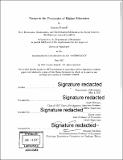Essays in the economics of higher education
Author(s)
Russell, Lauren (Lauren Cathleen)
DownloadFull printable version (9.635Mb)
Other Contributors
Massachusetts Institute of Technology. Department of Economics.
Advisor
David Autor.
Terms of use
Metadata
Show full item recordAbstract
This thesis consists of three studies in the economics of higher education. The first two chapters investigate the impacts of mergers of colleges and universities within US higher education markets. Chapter 1 is a case study of five recent consolidations within the University System of Georgia. Using student-level administrative data, I show that four-semester student persistence improves by 7 percentage points for cohorts who matriculate post-consolidation relative to cohorts at similar non-consolidated institutions. These large and significant gains do not come at the cost of increases in spending per student, which is indicative of improved productivity. Moreover, I find no evidence that USG takes advantage of increased market power to raise tuition and fees. In Chapter 2, I investigate whether the impacts of the recent consolidations within the University System of Georgia are typical of mergers throughout the public and private non-profit sector. Using institution-level panel data, I find that the average merger between 2000 and 2013 was not beneficial for students. The average merger had no impact on retention rates, and merging institutions raised tuition and fees for students by an average of 7 percent relative to non-merging institutions. To assess whether market power is the most likely explanation, I investigate and rule out three alternative explanations for price increases: higher educational costs, higher quality, and new degree offerings. The evidence is consistent with the exercise of market power. Chapter 3 evaluates a freshman learning community at MIT featuring smaller classes, revamped introductory courses, and a high proportion of female instructors called the Experimental Study Group (ESG). I exploit the lottery-based admission system to generate causal treatment effect estimates. Using detailed Registrar data, I find no statistically significant effects on academic outcomes for ESG enrollees generally. However, there is marginally significant evidence that women who participate in the program have higher GPAs and complete more credits of coursework. An analysis of the effect of instructor gender suggests that though female students earn higher grades when courses are taught by female instructors, the higher proportion of female instructors in ESG cannot fully explain the academic effects for women.
Description
Thesis: Ph. D., Massachusetts Institute of Technology, Department of Economics, 2017. Cataloged from PDF version of thesis. Includes bibliographical references.
Date issued
2017Department
Massachusetts Institute of Technology. Department of EconomicsPublisher
Massachusetts Institute of Technology
Keywords
Economics.